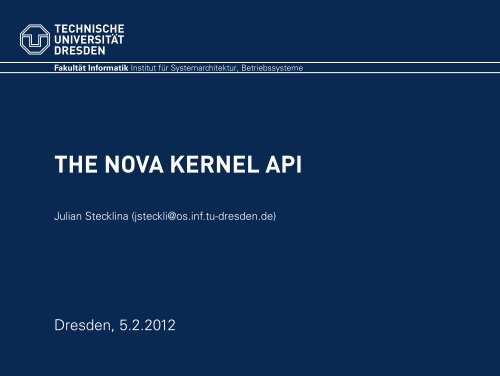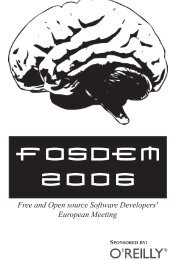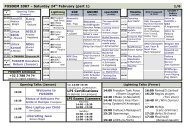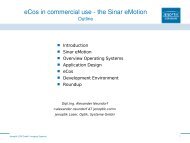You also want an ePaper? Increase the reach of your titles
YUMPU automatically turns print PDFs into web optimized ePapers that Google loves.
Fakultät Informatik Institut für Systemarchitektur, Betriebssysteme<br />
<strong>THE</strong> <strong>NOVA</strong> <strong>KERNEL</strong> <strong>API</strong><br />
Julian Stecklina (jsteckli@os.inf.tu-dresden.de)<br />
Dresden, 5.2.2012
00 Disclaimer<br />
This is not about OpenStack Compute.<br />
<strong>NOVA</strong> is mainly the work <strong>of</strong> Udo Steinberg (kernel) and Bernhard Kauer (userland).<br />
http://hypervisor.org/<br />
TU Dresden, 5.2.2012 The <strong>NOVA</strong> Kernel <strong>API</strong> Folie 2 von 26
00 Goals<br />
• not talking about virtualization propaganda,<br />
• giving a very short overview <strong>of</strong> <strong>NOVA</strong> as a whole<br />
• introducing basic concepts <strong>of</strong> the kernel <strong>API</strong><br />
In the end you should be able to pick up the <strong>NOVA</strong> <strong>API</strong> manual and make heads or<br />
tails <strong>of</strong> it.<br />
TU Dresden, 5.2.2012 The <strong>NOVA</strong> Kernel <strong>API</strong> Folie 3 von 26
01 <strong>NOVA</strong> OS Virtualization Architecture<br />
//os.inf.tu-dresden.de/papers_ps/steinberg_eurosys2010.pdf<br />
http:<br />
TU Dresden, 5.2.2012 The <strong>NOVA</strong> Kernel <strong>API</strong> Folie 4 von 26
01 What works, what doesn’t<br />
Works<br />
• x86 32-bit<br />
• SMP<br />
• VT-x, AMD-V<br />
• VT-d (Intel IOMMU)<br />
• SR-IOV<br />
• grub, syslinux, . . .<br />
• Linux, L4, . . .<br />
• emulates AHCI, igb, . . .<br />
• drivers for AHCI, some<br />
Intel NICs, . . .<br />
• experimental libvirt support<br />
Doesn’t work yet<br />
• Windows<br />
• Migration<br />
• Recursive Virtualization<br />
• 64-bit<br />
• being user-friendly ;-)<br />
• . . .<br />
TU Dresden, 5.2.2012 The <strong>NOVA</strong> Kernel <strong>API</strong> Folie 5 von 26
02 <strong>NOVA</strong> Architecture<br />
Reduce complexity <strong>of</strong> hypervisor:<br />
• hypervisor provides low-level protection domains<br />
– address spaces<br />
– virtual machines<br />
• one VMM per guest in (root mode) userspace,<br />
– possibly specialized VMMs to reduce attack surface<br />
– only one generic VMM implement so far<br />
TU Dresden, 5.2.2012 The <strong>NOVA</strong> Kernel <strong>API</strong> Folie 7 von 26
Demo
03 The L4 Influence<br />
<strong>NOVA</strong> cannot deny its roots in the L4 family:<br />
• task, threads, synchronous IPC<br />
• recursive mapping <strong>of</strong> memory<br />
TU Dresden, 5.2.2012 The <strong>NOVA</strong> Kernel <strong>API</strong> Folie 9 von 26
03 Capability-Based<br />
Syscalls operate on capabilities to kernel objects:<br />
• Protection Domain (PD) (“task”) — create pd<br />
• Execution Context (EC) (“thread”) — create ec, ec ctrl<br />
• Scheduling Context (SC) — create sc, sc ctrl<br />
• Portals (PT) — create pt, call, reply<br />
• Semaphore (SM) — create sm, sm ctrl<br />
TU Dresden, 5.2.2012 The <strong>NOVA</strong> Kernel <strong>API</strong> Folie 10 von 26
03 Capabilities<br />
Userspace can<br />
• create capabilities to objects (by creating kernel objects),<br />
• delegate capabilities (recursively, just as memory),<br />
Capabilities are stored per-PD in capability space in the kernel. A PD<br />
• uses index into capability space to name capabilities,<br />
• unforgeable.<br />
(Think file descriptors.)<br />
TU Dresden, 5.2.2012 The <strong>NOVA</strong> Kernel <strong>API</strong> Folie 11 von 26
03 Communication<br />
EC (thread)<br />
• bound to one PD (address<br />
space)<br />
• either thread or vCPU<br />
• has a special memory<br />
region (UTCB) for IPC<br />
Portals<br />
• entry point (instruction pointer)<br />
• bound to one EC<br />
• per client/function/. . .<br />
• pass data, delegate capabilities<br />
from UTCB to UTCB<br />
• can be called or implicitly used by<br />
exceptions (if a thread has the cap)<br />
TU Dresden, 5.2.2012 The <strong>NOVA</strong> Kernel <strong>API</strong> Folie 12 von 26
03 ECs and SCs<br />
There are two kinds <strong>of</strong> threads:<br />
with time<br />
• “global thread” or vCPU<br />
• stick SC to newly created EC<br />
• causes startup exception when<br />
first scheduled<br />
without time<br />
• “local thread”<br />
• bind portals to ECs<br />
• when portal invoked, starts<br />
executing at portal EIP<br />
• caller hands in time to handle<br />
the request (no scheduling<br />
decision)<br />
TU Dresden, 5.2.2012 The <strong>NOVA</strong> Kernel <strong>API</strong> Folie 13 von 26
03 Basic Server Scenario<br />
EC local<br />
(1) call<br />
EC global<br />
TU Dresden, 5.2.2012 The <strong>NOVA</strong> Kernel <strong>API</strong> Folie 14 von 26
03 Basic Server Scenario<br />
EC local<br />
(1) call<br />
EC global<br />
TU Dresden, 5.2.2012 The <strong>NOVA</strong> Kernel <strong>API</strong> Folie 14 von 26
03 Basic Server Scenario<br />
EC local<br />
EC global<br />
(2) reply<br />
TU Dresden, 5.2.2012 The <strong>NOVA</strong> Kernel <strong>API</strong> Folie 14 von 26
03 Resource Contention<br />
ECs are not reentrant.<br />
What happens when a second client wants to call a service?<br />
TU Dresden, 5.2.2012 The <strong>NOVA</strong> Kernel <strong>API</strong> Folie 15 von 26
03 Resource Contention<br />
EC local<br />
(1) call<br />
EC global<br />
TU Dresden, 5.2.2012 The <strong>NOVA</strong> Kernel <strong>API</strong> Folie 15 von 26
03 Resource Contention<br />
EC local<br />
(1) call (2) call<br />
EC global<br />
TU Dresden, 5.2.2012 The <strong>NOVA</strong> Kernel <strong>API</strong> Folie 15 von 26
03 Resource Contention<br />
EC local<br />
(1) call (2) call<br />
EC global<br />
TU Dresden, 5.2.2012 The <strong>NOVA</strong> Kernel <strong>API</strong> Folie 15 von 26
03 Resource Contention<br />
EC local<br />
(3) reply<br />
EC global<br />
(2) call<br />
TU Dresden, 5.2.2012 The <strong>NOVA</strong> Kernel <strong>API</strong> Folie 15 von 26
03 Resource Contention<br />
EC local<br />
EC global<br />
(4) reply<br />
TU Dresden, 5.2.2012 The <strong>NOVA</strong> Kernel <strong>API</strong> Folie 15 von 26
03 <strong>NOVA</strong>’s time management<br />
With SCs only bound to some threads, it is possible to build (simple) servers<br />
without time reservation.<br />
• How much time should service foo need anyway?<br />
• fewer things to schedule,<br />
• contended resources get “boosted” by clients as needed.<br />
TU Dresden, 5.2.2012 The <strong>NOVA</strong> Kernel <strong>API</strong> Folie 16 von 26
04 Hardware Support for Virtualization<br />
Late Pentium 4 (2004) introduced hardware support for virtualization: Intel VT.<br />
(AMD-V is conceptually very similar)<br />
• root mode vs. non-root mode<br />
– root mode runs hypervisor<br />
– non-root mode runs guest<br />
• situations that Intel VT cannot handle trap to root mode (VM Exit)<br />
• special memory region (VMCS) holds guest state<br />
• reduced s<strong>of</strong>tware complexity<br />
Supported by all major virtualization solutions today.<br />
TU Dresden, 5.2.2012 The <strong>NOVA</strong> Kernel <strong>API</strong> Folie 17 von 26
04 VT-x Problems<br />
VMCS (memory region holding guest state) needs to manipulated by VMM, yet<br />
• cannot be mapped into userspace,<br />
• have to use privileged VMREAD/VMWRITE instructions to access,<br />
• reading all content for every VM Exit is expensive.<br />
Kernel has to manage VMCS access.<br />
TU Dresden, 5.2.2012 The <strong>NOVA</strong> Kernel <strong>API</strong> Folie 18 von 26
04 Virtualization on <strong>NOVA</strong><br />
VM Exits (and normal exceptions) vector through special portals.<br />
• Portals created with bit field denoting interesting information (Message<br />
Transfer Descriptor, MTD)<br />
– for WRMSR or CPUID we need only general purpose registers<br />
– for page fault we need complete vCPU state<br />
• kernel puts this data in handler’s UTCB<br />
• handler produces new MTD on reply<br />
Reduce number <strong>of</strong> expensive VMREAD/VMWRITE in the kernel.<br />
TU Dresden, 5.2.2012 The <strong>NOVA</strong> Kernel <strong>API</strong> Folie 19 von 26
04 Writing to disk
04 Writing to disk<br />
Drv<br />
Handler IRQ<br />
Exc<br />
Shared<br />
Memory<br />
vCPU<br />
VMM
04 Writing to disk<br />
Drv<br />
Handler IRQ<br />
Exc<br />
MMIO<br />
Shared<br />
Memory<br />
vCPU<br />
VMM
04 Writing to disk<br />
Drv<br />
Handler IRQ<br />
"write<br />
data"<br />
Exc<br />
MMIO<br />
Shared<br />
Memory<br />
vCPU<br />
VMM
04 Writing to disk<br />
Drv<br />
Handler IRQ<br />
"working<br />
on it"<br />
Exc<br />
MMIO<br />
Shared<br />
Memory<br />
vCPU<br />
VMM
04 Writing to disk<br />
Drv<br />
Handler IRQ<br />
Exc<br />
Shared<br />
Memory<br />
vCPU<br />
VMM
04 Writing to disk<br />
Drv<br />
Handler IRQ<br />
Exc<br />
Shared<br />
Memory<br />
vCPU<br />
VMM
04 Writing to disk<br />
Drv<br />
Handler IRQ<br />
Exc<br />
recall<br />
Shared<br />
Memory<br />
vCPU<br />
VMM
04 Writing to disk<br />
Drv<br />
Handler IRQ<br />
Exc<br />
recall<br />
exception<br />
Shared<br />
Memory<br />
vCPU<br />
VMM
04 Writing to disk<br />
Drv<br />
Handler IRQ<br />
Exc<br />
inject<br />
irq<br />
Shared<br />
Memory<br />
vCPU<br />
VMM
04 Writing to disk<br />
Drv<br />
Handler IRQ<br />
Exc<br />
Shared<br />
Memory<br />
vCPU<br />
VMM
http://os.inf.tu-dresden.de/papers_ps/steinberg_eurosys2010.pdf
05 There is also . . .<br />
• Userspace Timer Service<br />
• Admission Server<br />
• Device Drivers (IOMMU!)<br />
• . . .<br />
TU Dresden, 5.2.2012 The <strong>NOVA</strong> Kernel <strong>API</strong> Folie 22 von 26
05 Summary<br />
The <strong>NOVA</strong> microhypervisor is a<br />
• fast capability-based<br />
microkernel<br />
• with virtualization<br />
in mind.<br />
Code at http://hypervisor.org/<br />
Supported by:<br />
Discuss at http://os.inf.tu-dresden.de/mailman/listinfo/l4-hackers<br />
http://ict-passive.eu/<br />
TU Dresden, 5.2.2012 The <strong>NOVA</strong> Kernel <strong>API</strong> Folie 23 von 26
06 Multiple CPUs<br />
Thread-related kernel objects are bound to one CPU:<br />
• Portals,<br />
• Execution Contexts,<br />
• Scheduling Contexts.<br />
Semphores work cross-CPU. Communication via Semaphores/recall.<br />
“Non-donating” cross-CPU IPC never really needed.<br />
Servers can be CPU-topology aware!<br />
TU Dresden, 5.2.2012 The <strong>NOVA</strong> Kernel <strong>API</strong> Folie 24 von 26
http://os.inf.tu-dresden.de/papers_ps/steinberg_eurosys2010.pdf
06 Livelock<br />
It’s possible to construct helping<br />
loops... Ouch!<br />
Pager<br />
Client<br />
Srv A<br />
Srv B<br />
TU Dresden, 5.2.2012 The <strong>NOVA</strong> Kernel <strong>API</strong> Folie 26 von 26
06 Livelock<br />
It’s possible to construct helping<br />
loops... Ouch!<br />
• Kernel detects loop<br />
• Random IPC is aborted<br />
Pager<br />
Client<br />
Srv A<br />
Srv B<br />
TU Dresden, 5.2.2012 The <strong>NOVA</strong> Kernel <strong>API</strong> Folie 26 von 26






